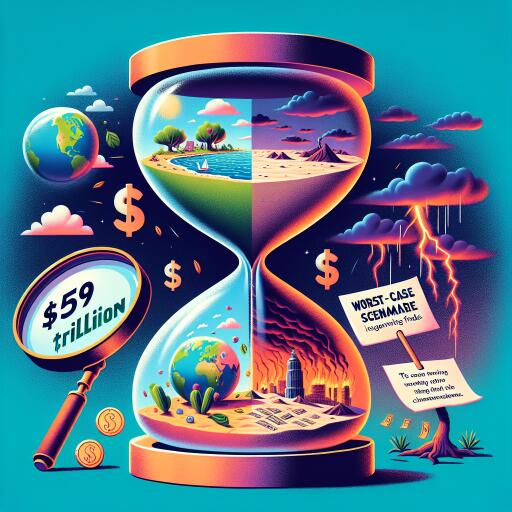
Climate Crisis To Cost World $59 Trillion in Worst-Case Scenario, Study Finds
In an alarming forecast for the global economy, recent findings reveal that climate change could slash worldwide income by 19% by the year 2050. The economic fallout, which amounts to an astounding $38 trillion annually, underscores a stark reality: the cost of inaction on climate change far exceeds the investments needed to limit temperature rises to two degrees Celsius. This groundbreaking study, deriving insights from over 1,600 regions across the globe and spanning four decades, was orchestrated to gauge the ongoing and future economic impacts triggered by changing climatic conditions.
Detailed analysis uncovers that regions across the board, from affluent North American and European areas to significantly vulnerable sectors like South Asia and Africa, will suffer substantial income contractions. Factors such as diminished agricultural productivity, decreased labor output, and compromised infrastructure stand as primary contributors to the anticipated economic strain. Furthermore, the research estimates global annual damages ranging between $19 to $59 trillion by mid-century, with temperature hikes playing a pivotal role alongside fluctuations in rainfall and the potential inclusion of extreme weather phenomena like storms or wildfires.
“The forthcoming economic damages over the next few decades will virtually spare no country, affecting both developed and developing nations alike,” the study suggests, pointing to the urgent need for adaptation efforts to mitigate some of these impacts. The narrative extends a dire warning: without swift and significant emission reductions, the long-term economic losses could spiral to 60% of the global average by 2100. This dramatic scenario not only underscores the cost-efficiency of adopting proactive climate policies but also highlights the severe human and biodiversity losses that transcend monetary valuations.
The novel aspect of this research lies in its granular focus—not just on national averages but on regional economic dynamics underpinned by temperature and precipitation shifts. This approach, accentuated with the latest climate models and historical economic response patterns, offers a detailed projection of climate-induced economic disruptions, illuminating both immediate and longstanding risks across diverse geographical landscapes.
An unsettling revelation from the study points to the disproportionate impact on tropical nations. These regions, already grappling with higher base temperatures, are poised to bear the brunt of further climate abnormalities, facing an income reduction rate significantly higher than their temperate counterparts. The countries least accountable for historical emissions find themselves at the forefront of vulnerability, often lacking adequate resources to combat or adapt to resultant adversities. According to the research, this underscores a global imbalance, where the repercussions of climate inaction weigh heaviest on those least responsible.
At the heart of these findings is a call to arms for sweeping changes towards renewable energy adoption and a departure from fossil fuel dependency. “Only by halting the combustion of oil, gas, and coal can we hope to stabilize global temperatures, steering away from a trajectory that could have cataclysmic outcomes,” the investigation concludes. This comprehensive study, aiming to quantify the economic ramifications of climate change, sends a clear message: the path our planet treads on today will determine the economic and environmental legacy we leave for generations to come.





Leave a Reply